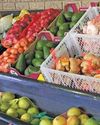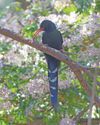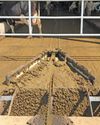
What are you farming? You may say fruit, grain, vegetables, livestock or pasture, but stripped to the bare essence, everybody is actually farming carbon to nitrogen, or more specifically, the soil. This was the message of Nico Uys, operations manager of Ezolimo Organics, at the SA Olive Field Day, held near Wellington in the Western Cape in January.
Uys said most of South Africa's soil had a carbon content of less than 0,5%, which means farmers are heavily dependent on external inputs to produce crops. However, by increasing the carbon content of soil, farmers can improve the chemical, biological and physical structure of the soil, which translates into huge cost savings by improving nutrient retention and reducing the vulnerability of crops to pests and diseases.
Such an improvement also renders crops less vulnerable to climate shocks. The soil becomes like a sponge that is better able to handle rain during the rainy season, less prone to erosion and topsoil washing away during heavy rains, and able to hold more water during dry months. Uys referred to research that found that the soil's water-holding capacity could almost be doubled with every 1% increase in carbon. For instance, the water-holding capacity of 100kg soil could increase from 20 to 40 if the carbon content of this soil were increased from 1% to 2%. It would increase to 2000 if the carbon content of this soil was raised to 5%.
"South African farmers should aim to build their soil carbon levels to between 2% and 2,5%. Higher levels have been achieved in Mpumalanga and Limpopo, but it is difficult in drier parts of the country. Levels of up to 5% have been achieved in some wetter and cooler parts of the world."
BUILDING SOIL CARBON LEVELS
This story is from the {{IssueName}} edition of {{MagazineName}}.
Start your 7-day Magzter GOLD free trial to access thousands of curated premium stories, and 9,000+ magazines and newspapers.
Already a subscriber ? Sign In
This story is from the {{IssueName}} edition of {{MagazineName}}.
Start your 7-day Magzter GOLD free trial to access thousands of curated premium stories, and 9,000+ magazines and newspapers.
Already a subscriber? Sign In

Agripreneur wins top award for butternut coffee
Bloemfontein-based agripreneur Chantelle de Bruyn has achieved global recognition.

Final fresh produce inquiry pins low level of transformation on farming environment
The Competition Commission released its final report on the Fresh Produce Market Inquiry in mid-January, maintaining that transformation in the industry was being impeded by a lack of support for emerging farmers.

Illegal fishing in Australia reveals market gap for farmed sea cucumber
Illegal fishing practices in Australia have revealed a large market opportunity for sea cucumber farming.

An introduction to the Ford Ranger Tremor
In December 2024, the CAR magazine team received the Ford Ranger Tremor to accompany them through the festive season and into the new year. Oliver Keohane looks at what the Tremor is all about.

A farmer's experience with bush encroachment
Farmer David Addenbrooke has worked in the Zimbabwean beef industry for around four decades. Here, he relates his experience with bush encroachment and offers farmers some advice on battling this scourge.

Good rains boost SA's summer grain crop prospects
This week, Absa AgriBusiness analyses several market dynamics and shares its expectations for local grain and oilseed prices over the coming months.

A self-help tool for getting young people engaged in agriculture
The active engagement of the youth in agriculture is pivotal to the sustainability and growth of the sector. Empowering them with the necessary support is key to nurturing future farmers who are equipped to overcome future challenges like the effects of climate change.Dr Primrose Madende, researcher at the Department of Agricultural Economics at the University of the Free State

Rallying to the cackle of this raucous bird
The gregarious and territorial Green Wood-hoopoe, also known as the Red-billed Wood-hoopoe, is extremely vocal and is often heard before it is seen. And for very good reason,

SA coffee lovers can expect price increase
South African coffee prices are expected to spike sharply in the foreseeable future because of failed crops in the country’s main importing countries: Brazil and Vietnam.

Paving the way for a greener dairy industry
The dairy industry is often criticised for its environmental impact, but a new innovation called DESTiny aims to empower farmers to take control of their carbon footprints. Riana Reinecke, the tool's developer, explained to Glenneis Kriel how it works and how farmers can benefit from it.